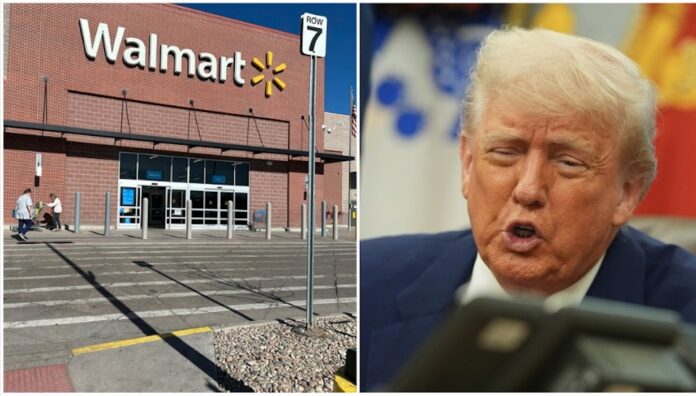- Trump tells Walmart to eat the tariffs and stop raising prices on goods like car seats and bananas, making headlines as Trump hits Walmart with new demands.
- Walmart warns that even reduced tariffs still lead to higher costs for customers. Trump hits Walmart again by insisting they should absorb the costs.
- U.S. companies face tough choices as tariffs increase pressure on supply chains and profits.
Donald Trump went after Walmart on social media. He told the retail giant to “eat the tariffs” and stop blaming his trade policies for raising prices. Trump’s post came just days after Walmart warned customers that prices on many everyday products could soon increase. These items include bananas and children’s car seats. Trump made it clear he wants the company to absorb those costs instead of passing them to American families. He believes Walmart, which made billions last year, can afford to do so. In his Truth Social post, he said, “Walmart should STOP trying to blame tariffs as the reason for raising prices throughout the chain… Between Walmart and China they should, as is said, ‘EAT THE TARIFFS,’ and not charge valued customers ANYTHING.”
Walmart Warns Customers About Higher Prices: Trump Hits Walmart’s Prices
Walmart spoke out on Thursday during its first-quarter earnings call. CEO Doug McMillon explained how tariffs will lead to higher prices, even at current levels. “We can control what we can control,” McMillon said. “Even at the reduced levels, the higher tariffs will result in higher prices.” The price increases could hit stores by the end of this month. These warnings came despite the recent decision by the Biden administration to lower some tariffs on Chinese goods for a limited time. While the tariffs dropped from 145% to 30% for 90 days, McMillon made it clear that the relief wouldn’t be enough to stop costs from rising.
Walmart Says It Works Hard to Keep Prices Low After Trump Hits Walmart
After Trump’s post, Walmart quickly responded. A spokesperson told CBS News, “We won’t stop” trying to keep prices down. The company said it always aims to help customers save money. “We’ll keep prices as low as we can for as long as we can given the reality of small retail margins,” the spokesperson said. Walmart wants shoppers to know that it takes pride in affordability, but inflation and tariffs are now serious challenges. Even the strongest retailers must make tough choices when costs rise.
U.S. Companies Struggle With Tariff Decisions
Many American companies now face difficult choices. They must decide whether to eat the extra costs or pass them along to customers. Trump has used tariffs to pressure foreign countries, but U.S. businesses often feel the squeeze. He has told other industries, including automakers, not to raise prices. Still, many experts say his tariffs drive up production costs. Companies like Amazon and Apple have already warned about major disruptions in their supply chains. Trump’s trade policies have created tension not just with trading partners, but also with some of the country’s largest corporations.
Trump Met With Retailers But Stuck to His Plan
In April, Doug McMillon and other retail leaders met with Trump at the White House. They shared their concerns about tariffs and the impact on U.S. shoppers. Despite those warnings, Trump continued to push his economic agenda. He believes tariffs will bring more manufacturing jobs back to America. He has often claimed that foreign companies, not U.S. businesses, will pay for the new trade policies. But many business leaders say that’s not how it works in practice. They argue the costs usually hit companies and consumers instead.
Tariffs Could Push Prices Up by 29 Percent
Walmart’s chief financial officer, John David Rainey, gave a clear example. He said that some car seats made in China now cost about $350. After tariffs, that same car seat could soon cost $450. That’s a 29% jump. Rainey said, “We’re wired to keep prices low, but there’s a limit to what we can bear, or any retailer for that matter.” His words reflect the stress many large retailers now feel. Even companies with strong sales say they can’t absorb rising costs forever. And as prices increase, many shoppers may pull back on spending.
Consumers Feel the Impact as Companies Lower Forecasts
Tariffs aren’t just hurting big businesses. They’re also affecting the daily lives of American families. Many companies have lowered their financial forecasts. They expect slower sales as people cut back on non-essential spending. With prices climbing and wages staying flat, shoppers may have fewer dollars to stretch. Analysts say inflation, combined with new tariffs, could damage consumer confidence heading into the next quarter. Several companies have already warned shareholders of possible revenue drops due to changing trade policies.




